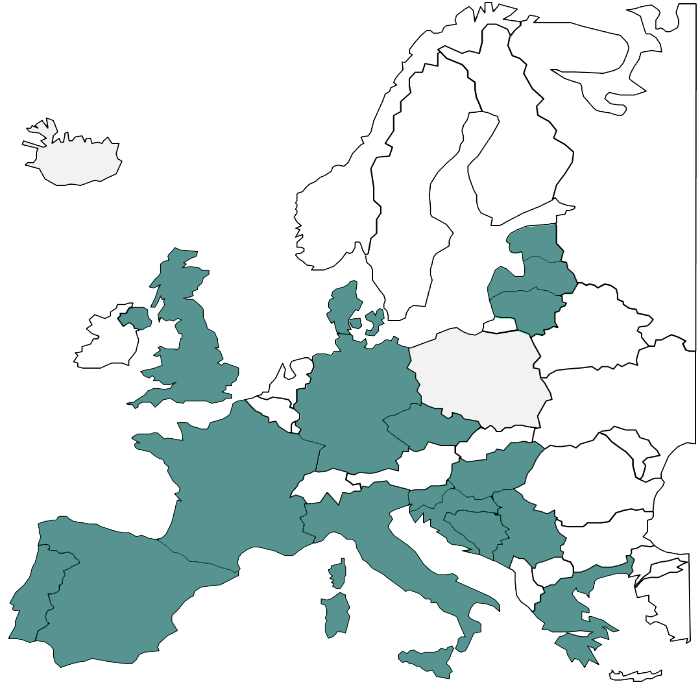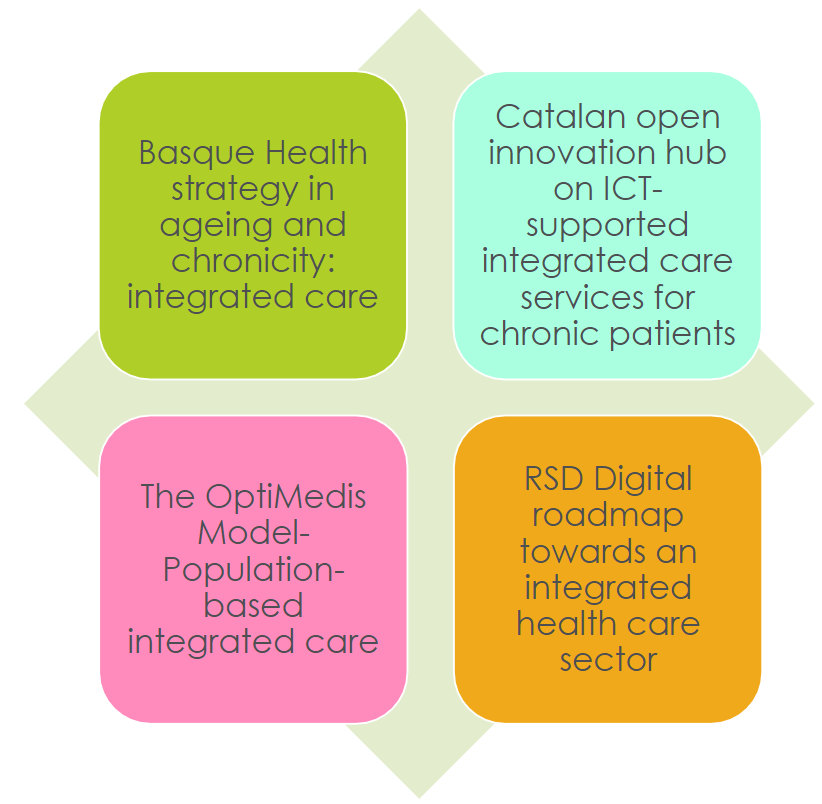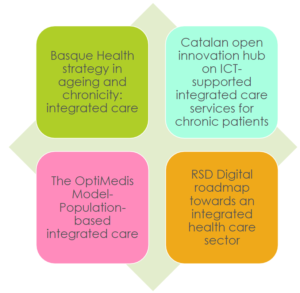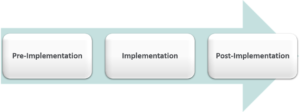The Joint Action (JA) on implementation of digitally enabled integrated person-centered care (JADECARE) is part of a series of initiatives the EU has launched to face the challenges of the transformation of health and care in the EU. JADECARE intends to reinforce the capacity of health authorities to successfully address important aspects of health system transformation, in particular the transition to digitally-enabled, integrated, person-centred care in the EU. For this purpose, 17 EU countries participate in JADECARE.
In order to achieve these goals four original “Good Practices” support participating regions of member states to transfer the successful practices and generated knowledge into the healthcare systems of the participating partners.
This EU-funded JA starts on October 1st, 2020 and ends on September 30th, 2023. The project’s achievements are designed for sustainability so that health inequalities within the EU are reduced in the future and innovations on digitally enabled person-centered care solutions are encouraged in the long run.

JADECARE INVOLVES PARTNERS FROM 17 COUNTRIES
ALL AROUND EUROPE .
The ageing of the population with the growing burden of chronic conditions and multimorbidity is steadily increasing the demand for a more extended and efficient care and a more intelligent outcome-based delivery of personalized care in an integrative and coordinated approach.
Innovative solutions are needed to deliver efficient integrated person-centered services based on citizen’s needs through new technologies, products and organizational changes.
Digital innovation tools and services have the potential and have proven in good practice innovative models of integrated care, to facilitate and support these changes delivering more targeted, personalized and high-quality healthcare to the population.
JADECARE will contribute to innovative, efficient and sustainable health systems, providing expertise and sharing good practices solutions of digitally enabled integrated person-centered care to assist the Member States in undertaking sustainable health system reforms.

AIMS & GOALS

- Contribute to innovative, efficient and sustainable health systems, providing expertise and sharing good practices to assist the Member States in undertaking health system reforms
- Enable the participating national authorities and those beyond the Consortium, to benefit from efficient solutions in digitally enabled integrated person-centered care developed by the “Early adopters” of the original Good Practices (oGPs)
- Reinforce the capacity of health authorities to successfully address important aspects of health system transformation, in particular the transition to digitally enabled, integrated, person-centred care
- Support the best practice transfer from the systems of the “Early adopters” to the ones of the “Next adopters”

EXPECTED OUTCOMES

- To contribute to the creation of innovative, efficient and sustainable integrated health care systems focused on the individual person
- To encourage innovation, enhance the sustainability of health systems, and improve their health care performance and outcomes.
- To achieve the digital transformation of health services in which professional end users, care users or citizens, health providers, digital solutions providers and governments will have a key role.
JADECARE will improve collaboration and trust among participating agents, support knowledge transfer and learning, and generate evidence on integrated care. This will produce benefits beyond the time frame of the Joint Action. JADECARE will share its main findings and ensure the sustainability of policies at local, regional and national levels

INTERVENTION & METHODOLOGY


PARTNERS
17 Competent Authorities
31 Affiliated Entities
23 Next Adopters from 15 European Countries
17 Competent Authorities
31 Affiliated Entities
23 Next Adopters from 15 European Countries

Spain:
- Kronikgune Institute for Health Services Research (JADECARE Coordinator)
- The Regional Ministry of Health of Andalusia
- Cantabrian Health Service
- Chronic Patient Care Strategy in Castilla y León
- Murcian Health Service
- Catalan Agency for Health Quality and Evaluation (AQuAS)
- August Pi i Sunyer August Pi i Sunyer Biomedical Research Institute (IDIBAPS)
- Andalusian Public Foundation Progress and Health
- Valdecilla Biomedical Research Institute (IDIVAL)
- The Foundation for Health Training and Research of the Region of Murcia
Bosnia & Herzegovina:
- Institute for Public Health of the Federation of Bosnia and Herzegovina (ZZJZFBIH)
Croatia:
- Central Public Health Institute Rep.of Croatia (CIPH)
Czech Republic:
- Ministry of Health of the Czech Republic (MZCR)
- University Hospital Olomouc (UHO)
Denmark:
- North Denmark Region (RND)
- Region of Southern Denmark (RSD)
Estonia:
- Ministry of Social Affairs Estonia (EMSA)
- Viljandi Hospital (VH)
France:
- Eurometropole de Strasbourg (EUSTRAS)
Germany:
- Authority for Labor, Health and Social Affairs, Family and Integration Hamburg (BAGSFI)
- Bavarian Health and Food Safety Authority (LGL)
- Centre for Telematics and Telemedicine Gmbh (ZTG GmBH)
- Subcontracted by EUSTRAS, France: Optimedis AG
Greece:
- 4th Regional Health Authority of Macedonia (4THYPE)
- School of Medicine, Aristotle University of Thessaloniki (AUTH)
Hungary:
- National Healthcare Service Center – (AEEK)
- Semmelweis University – Health Services Management Training Centre (SU-HSMTC)
- Jahn Ferenc Délpesti Kórház és Rendelőintézet (public hospital) (JFDPK)
Italy:
- National Agency for Regional Healthcare Services (AGENAS)
- Local Health Agency Naples 2 Nord – (ASL NA2)
- Lombardy Region (LOMBARDIA)
- Tuscany Regional Health Agency – (ARS TOSCANA)
- Local Health Agency Umbria 1 (USL UMBRIA 1)
- Regional authority Marche Region (MARCHE)
- PROMIS – ULSS Agency No 4 Venice East (PROMIS)
- Italian Ministry of Health -MhH)
Latvia:
- National Health Service (NVD)
- Childrens Clinical University Hospital (CCUH)
Portugal:
- Central Administration of the Health System (ACSS)
- NOVA National School of Public Health Lisbon (ENSP/NOVA)
- Shared Services of the Portuguese Ministry of Health (SPMS)
Serbia:
- Ministry of Health of Republic of Serbia (MoHRS)
Slovenia:
- National Institute of Public Health (NIJZ)
- Health Insurance Institute of Slovenia (ZZZS)
United Kingdom:
- Health and Social Care Board (HSCB) Northern Ireland
For highlighting partners’ roles in health systems and integrated health care, uniform English names are provided.
For the official organization names in their national languages refer to CHAFEA project partner list




